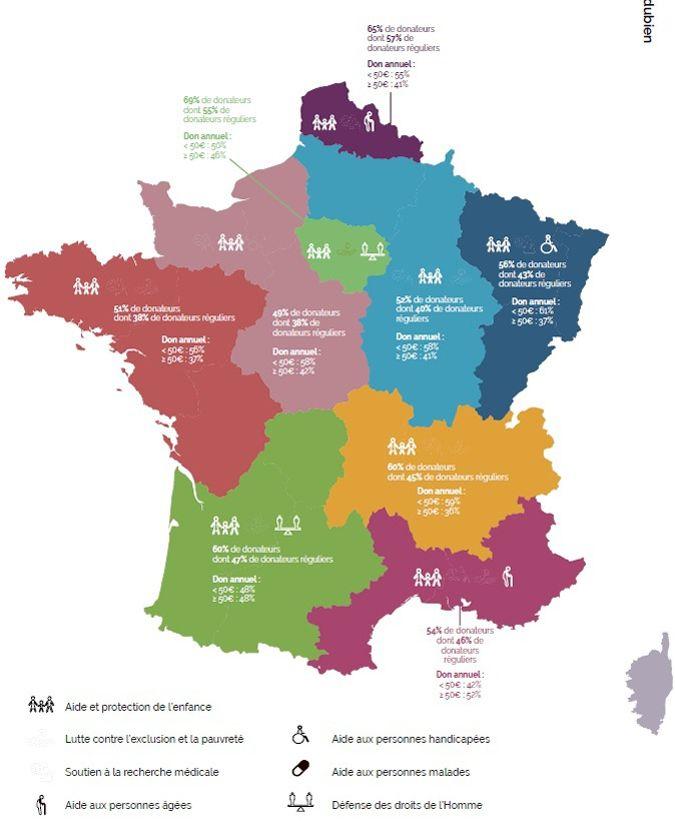donations to large charities and foundations have made further progress in 2015, according to a study from France Bounties, although at a lower pace than in the previous year.
Faithful despite the difficulties. It is the portrait of the donor that French draws this Monday, the new study from France Generosities, a trade association which represents 89 associations and foundations (Action against hunger, Aids, Amnesty International, Unicef, Sidaction, etc.). In 2015, donations to these structures have further increased 1.73%, marking however, a slowdown compared to 2014 (+2.4 per cent). “This little slowdown can be explained by the blow that had made up the attacks on the French,” says Nolwenn Poupon, head of studies and communication.
If the donations have continued to increase in 2015, despite the difficult context, this is because the existing donors have been more generous: the average amount of donation by cheque or other means of payment (57% of donations) has reached 63 euros in 2015, compared to 60.6 in 2014, whereas it is maintained to 12.8 euros per month for automatic withdrawals (43% of the donations). Online giving, which represents 6% of the collection overall, remained at 104 euros on average.
Overall, 58% of the French say they financially support the associations and foundations. Among them, 46% give regularly (once or more per year). It is during the period of the festivals of end of the year they are more generous: 41% of donations are made on the last quarter of the year, half of which on the single month of December.

Breakdown of donation by region. Source: France generosities
who are these gifts? Mainly associations and foundations which work for the protection of childhood, medical research and the fight against exclusion. The under 35 years of age, who represent 23% of the donors prefer, for their part, the protection of animals, the international emergency aid or assistance to victims of conflict. “There is a generational cleavage between the 50 years and older, who do more to promote the protection of the weakest and least 50 years of age, who are in favour of the fight against poverty or thematic humanistic and international (in particular the least 25 years of age)”, the study found.
“a Volunteer, the gift has a very different nature from that of the tax – “
regardless of the cause defended, the gift is intended as a source of happiness, says France Generosities. The union has also just launched a campaign to call the gift, dubbed #donnerfaitdubien, based on this argument. “The volunteer, the gift has a very different nature from that of the tax. Because he decides if he gives, how he gives and to whom he gives, the donor feels all at once feelings of autonomy, pride, and meaning that the taxpayer can barely feel it,” says Mickaël Mangot, an economist of happiness, author of the book “Happy as Croesus? Unexpected lessons from economics of happiness,” cited in the study.
This campaign is primarily intended to convince new donors. “Our finding is that the donors in France today are older and even if they are faithful, the challenge for the next few years is to hit a target more young. We want to rejuvenate the potential donors by using their codes and their vectors of information,” says Nolwenn Poupon, head of studies and communication, also cited in the investigation.
other challenges are on the side of the legislative developments that may impact the generosity of the French. As the deduction at source of income tax, scheduled for 2018. With this system, the tax credits will be taken into account in mishaps which means that taxpayers do not receive the benefit until September of the following year when calculating the balance. However, the reduction of tax, of between 66% and 75% of the amounts paid, is one of the sources of motivation of the donor.
The foundation is also concerned about proposals by some candidates in the presidential election to remove the Tax on wealth (ISF). Since the Tepa law of 2007, donations to foundations are deductible from the wealth tax to 75% in the limit of 50,000 euros. A measure that has boosted the philanthropy of the richest in recent years. According to a recent study from Research & Solidarity, the grant of the ISF is expected to reach 250 million euros this year. An amount up to 80% in six years.
No comments:
Post a Comment